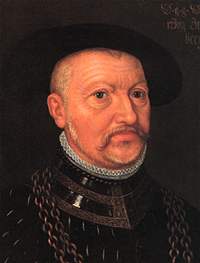 Marriage Law Code of Duke Ulrich of Württemberg,
1537
Marriage Law Code of Duke Ulrich of Württemberg,
1537
|
|
| [Introductory note: Historians of
marriage and the family in
Europe frequently point to the sixteenth century and the Reformation in
particular as a crucial turning point, when the institution of marriage
became much more patriarchal than it had been earlier. Previously,
according
to one version of this argument, the extended family and kin-group had
had a much greater say in the choice of a marriage partner; afterwards,
increasingly, that decision was left for fathers as household heads to
decide. Another version of this argument sees in the Reformation era a
shift toward a much more patriarchal organization of marital and social
roles generally, which was reflected in the enhanced capacity of
husbands
and fathers to control the sexuality of wives and daughters.
The Marriage Law Code (Eherechtsordnung) of the Duchy of Württemberg in southwestern Germany is fairly typical of the attempts by early sixteenth-century Protestant monarchs to establish their authority in matters pertaining to marriage and family law, traditionally the province of ecclesiastical (or "canon") law. Notice that reform begins with what many Protestants regarded as the cardinal abuse of canon law on marriage: the binding legitimacy it accorded to secret betrothals, especially if these were consummated. Secret vows of betrothal are banned; marriages concluded without parental consent are nullified; premarital sex is outlawed. It is already taken for granted that priests may marry -- a policy to shared by all reforming princes and city-states (see the Augsburg Confession of 1530, Article 23). On the other hand, the code allows divorce on only two grounds, abandonment and adultery. This regulation is consistent with a theology of marriage grounded in Scripture, as the Reformers read it. The dominant figure in the region that included Württemberg was Johannes Brenz, pastor in the imperial city of Schwäbisch Hall, who based his arguments on Matthew 5:19. |
This passage he understood to recognize
adultery as grounds for divorce.
But Brenz and other followers of Luther also argued that worldly
authorities
must be motivated by the need to maintain a moral, orderly, and
peaceful
society. To that end they might add additional grounds for divorce
beyond
adultery, in the interest of social order, as long as these remained
consistent
with the Biblical teachings and the underlying purpose of marriage. As
a result, most Protestant marriage law also recognized abandonment as
grounds
for divorce, as Württemberg's does. Other codes allowed sexual
incompatibility
-- the withholding of sex -- as grounds for divorce, as Luther himself
had done].
§1. Parental Consent in
Marriage
Note: Section titles, not included in the German original text, are added here for the sake of clarity. |